Military diplomacy paying off
Updated: 2013-08-28 07:55
By Zhao Xiaozhuo (China Daily)
|
||||||||
The participation of Chang Wanquan, state councilor and defense minister, in the ASEAN Defense Ministers' Meeting plus representatives from eight partner countries in Brunei on Aug 29 will be another achievement of China's military diplomacy. By following the developments and changes in the international order, taking part in multilateral mechanisms and shouldering regional and global responsibilities, China has become an important force advancing multilateral security cooperation in the Asia-Pacific region.
China's military diplomacy will have a far-reaching impact on the development of a new security concept and the setting up of a new security structure in the Asia-Pacific. The country has already played a key role in the establishment of ADMM-Plus to override the alliance system that prevailed in the region during the Cold War era. This is important because despite being the most economically dynamic region in the world, Asia-Pacific's security structure is still dominated by Cold War mentality and military alliances.
The ADMM-Plus comprises the 10 ASEAN member states and eight dialogue partners - China, the United States, Russia, Japan, the Republic of Korea, Australia, New Zealand and India. It is by far the most inclusive and highest-profile regional defense and security mechanism that focuses on deepening mutual trust and promoting pragmatic cooperation.
Since 2010, the Chinese military has been participating in ASEAN's cooperation programs in five non-traditional security areas, humanitarian assistance and disaster relief, peacekeeping operation, counter-terrorism, offshore safety and military medicine. In June 2013, China sent People's Liberation Army personnel, including engineers, and Navy hospital ship Peace Ark to Brunei to take part in the ADMM-Plus Humanitarian Assistance and Disaster Relief and Military Medicine Exercise.
The evolution of the ADMM-Plus mechanism will help the countries in the region to phase out their old-fashioned bilateral military alliances, which target a third party, and set up a comprehensive, cooperative and common security structure in the region.
China has also been participating in defense and security cooperation under the framework of the Shanghai Cooperation Organization and advocating value concepts that are in line with the trend of peace and development. Because of China's continuous efforts, the cooperation level among SCO member states has steadily improved. Among the positive developments of China's efforts are the commencement of an SCO defense ministers' meeting, convocation of member states' chiefs of staff, holding of joint military exercises, extensive exchanges in personnel training and frontier defense cooperation.
The SCO defense and security cooperation is immersed in the "Shanghai Spirit", which essentially means mutual trust, mutual benefit, equality, consultation, respect for social and political differences and seeking of common development. The "Shanghai Spirit" follows the principle of non-alliance, non-confrontation, non-targeting of other countries and organizations, and openness.
Through defense and security cooperation, the SCO has strengthened unity among its member states, deepened mutual military and security trust, improved members' capability to jointly deal with new challenges and threats, and thus played an important role in safeguarding peace and stability in the region.
China has been taking part in the Asia-Pacific defense dialogue, too, to foster common regional security concepts. Given the regional diversification, and social, political and cultural differences, different countries understand regional security differently, hindering security cooperation in Asia-Pacific.
In recent years, an increasing number of military leaders and experts from China have taken active part in various regional and global military dialogues and conferences such as the Shangri-La Dialogue, the Council for Security Cooperation in the Asia-Pacific Region Dialogue and the Jakarta International Defense Dialogue. And they have used these occasions to introduce China's new security concept featuring mutual trust, mutual benefit, equality and coordination to build a harmonious Asia-Pacific, and to allay fears on the modernization of the Chinese military.
The Xiangshan Forum, sponsored by the PLA, has now grown into a security dialogue with certain international features. By taking the initiative in setting the agenda, the forum can help foreign academics take a more objective view of China and its military development, and increase Sino-foreign military exchanges and deepen mutual understanding and trust.
China has been fulfilling its due international obligations as a responsible power. The country sent its military observers abroad for the first time in 1990, and since then it has contributed 22,000 personnel to 23 UN peacekeeping missions. In fact, China is the largest contributor of troops to UN missions among the five permanent UN Security Council members.
Following the resolutions of the UN Security Council, the PLA Navy has dispatched 17 batches of warships on regular escort missions in the Gulf of Aden and waters off Somalia since 2008 to safeguard the international waterway.
The Chinese military's participation in UN peacekeeping operations and escort missions shows how committed the Chinese government is to world peace. And State Councilor Chang Wanquan's participation in ADMM-Plus will further confirm that commitment.
The author is a researcher at the Center on China-America Defense Relations, Academy of Military Science, PLA.
(China Daily USA 08/28/2013 page12)

 Five apps to help you 'breathe' in Beijing
Five apps to help you 'breathe' in Beijing
 Wozniacki survives battle with Chinese qualifier
Wozniacki survives battle with Chinese qualifier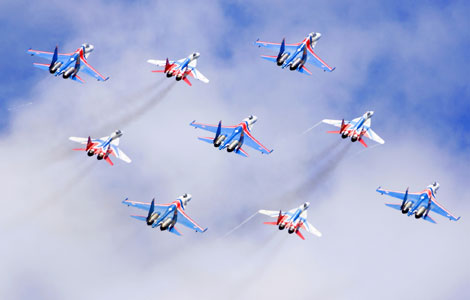
 Moscow air show opens with flight demonstrations
Moscow air show opens with flight demonstrations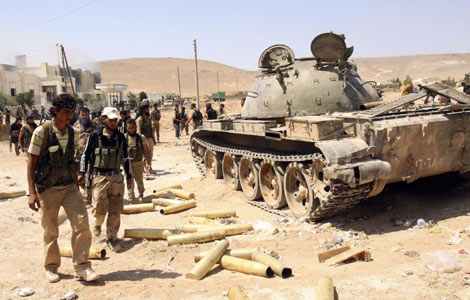
 US preparing for probable strike on Syria
US preparing for probable strike on Syria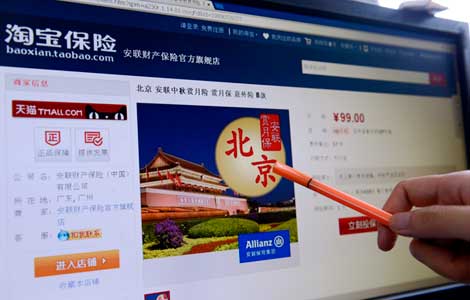
 Putting money on full moon
Putting money on full moon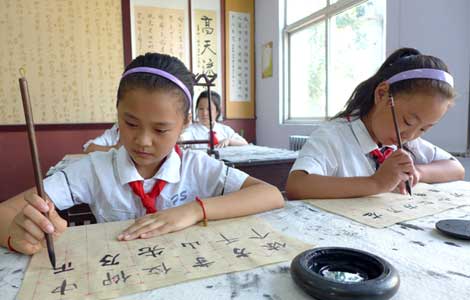
 Language list aims to pass on Chinese culture
Language list aims to pass on Chinese culture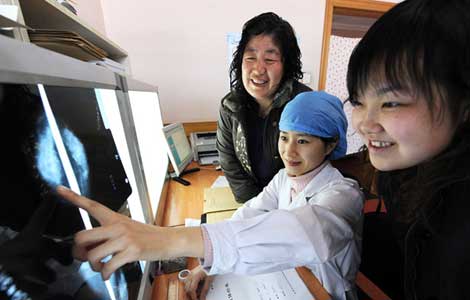
 Cancer patient delivers healthy baby
Cancer patient delivers healthy baby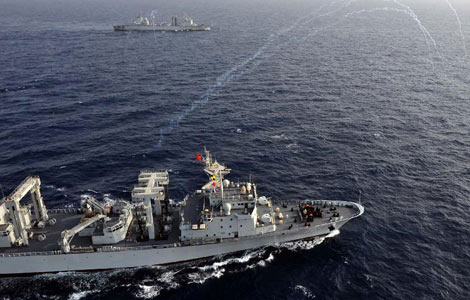
 Chinese navy starts escort mission at Gulf of Aden
Chinese navy starts escort mission at Gulf of Aden
Most Viewed
Editor's Picks

|

|

|

|

|

|
Today's Top News
US envoy to visit DPRK to secure prisoner's release
US 'must consider impact' of winding down QE
China gearing up for plenary session
Japan suspends rocket launch at last minute
Global expertise a scarce asset for employers
Sino-Japanese meeting at G20 ruled out
New time limits for visa processing
Trending news across China
US Weekly

|

|







